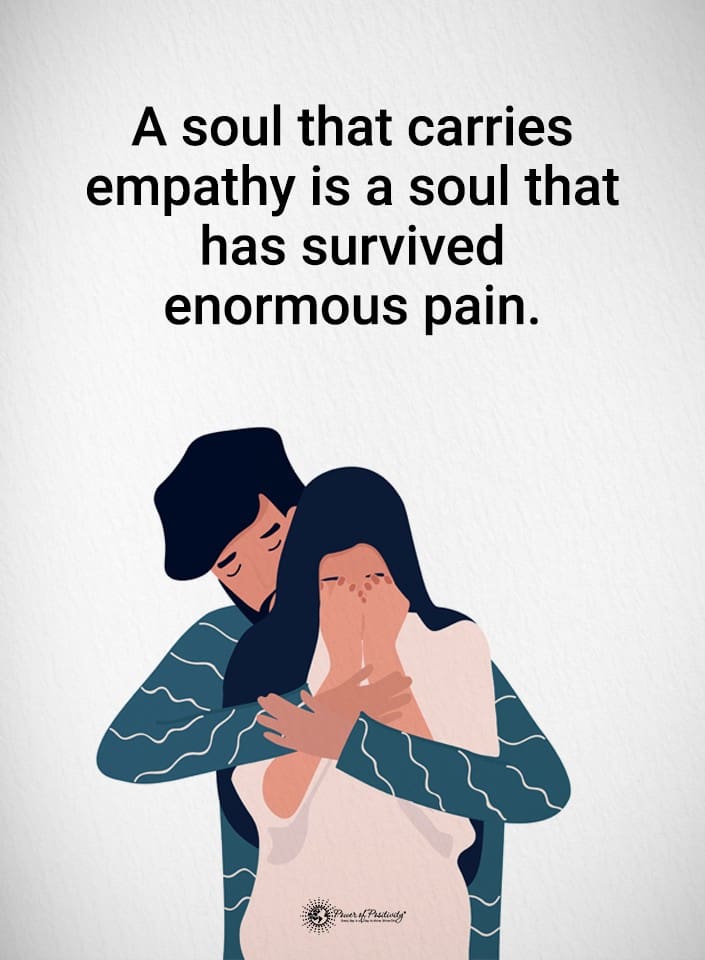Here’s what happens when empathy takes an alarming twist.
Empathy, which involves understanding and sharing the emotions of others. Most consider it a virtue that fosters compassion and connection. However, a lesser-known facet of empathy delves into the depths of human psychology—the realm of the dark empath. Dark empaths possess distinct traits that can impact interpersonal dynamics, and understanding these signs is crucial for recognizing and navigating relationships with them.
Empaths, in general, possess an innate ability to understand and share the emotions of others intuitively. Dark empaths, also known as shadow empaths, have a more profound and complex psychological makeup. They can tap into the darker aspects of human emotions, including pain, fear, and manipulation.
When dealing with a dark empath, it is crucial to approach the relationship with empathy while maintaining a solid sense of self-awareness. By understanding their unique characteristics, we can foster healthier relationships and create an environment of empathy that benefits both parties involved. In the following sections, we will delve into the ten telltale signs that indicate you may be dealing with a dark empath.
By familiarizing yourself with these signs, you will gain valuable insights into their motivations, actions, and the underlying dynamics of your relationship. Armed with this knowledge, you can navigate these relationships with compassion, self-assurance, and a deeper understanding of the complexities of connecting with a dark empath.
Understanding the Dark Empath
On the empathy spectrum, dark empaths occupy a unique position. While traditional empaths possess a natural capacity for empathy and empathic individuals strike a balance between emotional sensitivity and rationality, dark empaths dive into the darker aspects of the human experience.
They fearlessly navigate the complexities of negative emotions, offering profound insights and support rooted in their intuitive understanding of emotional pain. However, constant exposure to intense emotions and suffering poses challenges. Thus, dark empaths must recognize and manage their emotional boundaries to maintain their well-being while extending empathy to others.

Manipulative Tendencies Coming From Twisted Empathy
Dark empaths exhibit manipulative tendencies characterized by emotional manipulation, exploitation of vulnerabilities, and hidden motives. They are keen to influence others, leveraging their empathy to gain control and advantage.
By understanding these tendencies, individuals can navigate relationships cautiously, setting boundaries and protecting their emotional well-being. Recognizing the hidden motives and vulnerabilities being exploited by dark empaths becomes crucial for maintaining balanced and authentic connections.
Lack of Emotional Boundaries
Dark empaths often lack emotional boundaries, experiencing empathic overload and unregulated absorption of others’ emotions. Their heightened sensitivity leads to overwhelming emotional burdens as they absorb and carry the emotions of those around them. This inability to filter and process effectively results in constant emotional entanglement, blurring their identity and well-being.
Recognizing and addressing the absence of emotional boundaries is crucial for establishing healthy relationships. Supporting dark empaths in developing self-care practices and emotional regulation techniques helps manage empathic overload and encourages the establishment of clear boundaries, fostering emotional well-being and balanced connections.
Narcissistic Traits Often Present in a Dark Empath
Narcissistic traits can manifest within dark empaths, revealing a complex interplay of self-centeredness, manipulative charm, and a profound need for validation and control. These individuals often prioritize their agendas and desires, seeking personal gratification and admiration. Their charm can be alluring, drawing others in while hiding underlying manipulative tendencies.
Dark empaths may strategically employ their empathic abilities to influence and navigate interpersonal dynamics, often exploiting vulnerabilities to maintain a sense of power. At the core of their behavior lies a deep-seated need for validation, seeking external affirmation to reinforce their self-worth. They yearn for admiration and recognition; validation becomes crucial for their emotional well-being.
Simultaneously, their desire for control may stem from a fear of vulnerability as they strive to protect themselves from potential emotional harm. Recognizing this narcissism is pivotal when engaging with dark empaths. Setting and maintaining boundaries is essential to safeguard emotional well-being and prevent manipulation.
While navigating relationships, it is essential to balance empathy and self-care, ensuring that personal needs and boundaries are respected. By understanding and addressing these complexities, healthier and more balanced connections can be fostered.
Emotional Vampirism
Emotional vampirism, aka energy drain or emotional feeding, is a prevalent characteristic among dark empaths, often called psychic vampires. These individuals can subtly drain the emotional energy and life force of those around them, leaving their targets feeling emotionally depleted and drained.
Dark empaths actively or passively target individuals with strong emotions or vulnerabilities as a source of emotional sustenance. They instinctively recognize and exploit these emotional energy reservoirs, deriving a sense of validation, power, or fulfillment from these interactions. In their presence, others may experience a gradual decrease in their emotional energy, leaving them feeling drained, exhausted, or even disconnected from their own emotions.
Deceptive Empathy
Deceptive empathy is a prominent and unsettling trait observed in dark empaths. These individuals possess the uncanny ability to feign empathy, exhibit manipulative compassion, and demonstrate insincere understanding. They skillfully mimic emotions, creating an illusion of empathy that serves their manipulative agenda.
Dark empaths utilize their apparent understanding and compassion to exploit vulnerabilities and maintain power dynamics in relationships. They strategically tap into others’ emotions, leveraging their feigned empathy to gain trust and control. Behind their seemingly empathetic facade lies a hidden agenda to fulfill their desires and manipulate others for personal gain.
What sets dark empaths apart is their ability to manipulate emotions without forming genuine emotional connections. Their understanding lacks the depth and sincerity that characterizes genuine empathy. While they may appear understanding, their motivations are driven by self-interest, often disregarding the well-being and feelings of those around them.
Recognizing the deceptive nature of empathy displayed by dark empaths is essential for protecting one’s emotional well-being. By being aware of their tactics and discerning their insincere understanding, individuals can establish clear boundaries and exercise caution in their interactions. This includes balancing trust with discernment and carefully evaluating the authenticity of the empathy displayed by others.
Emotional Exploitation
Dark empaths possess the ability to exploit the emotional vulnerabilities of others, employing manipulative tactics to exert control and influence. They keenly identify weaknesses and insecurities, using them as leverage to serve their interests. Exploitative tactics, such as emotional manipulation and gaslighting, enable them to maintain dominance and shape the emotions and actions of their targets.
Their manipulative influence extends beyond surface-level interactions, often employing emotional blackmail and guilt-tripping to achieve their goals. Recognizing emotional exploitation is crucial for establishing healthy boundaries and self-protection. By knowing their tactics, individuals can navigate relationships with greater discernment and safeguard their emotional well-being.
Lack of Remorse and the Dark Empath
Dark empaths lack remorse, characterized by guilt, absence of empathy, and unapologetic behavior. They engage in manipulative tactics and harmful actions without remorse or taking responsibility for the consequences. Their deficiency in empathy prevents them from fully understanding the emotional impact of their actions on others.
This lack of remorse leads to unapologetic behavior, as they prioritize their own needs and desires over the well-being of others. Recognizing the absence of remorse is vital for protecting one’s emotional well-being. Establishing and reinforcing personal boundaries becomes essential when engaging with dark empaths who exhibit unapologetic behavior. Prioritizing self-care and emotional protection safeguards one’s well-being in relationships with dark empaths.
Emotional Drain on Others
Dark empaths cause an emotional drain in relationships, leading to toxicity and emotional exhaustion. Therefore, knowing this impact is vital for self-care. These individuals absorb and manipulate emotions, leaving others feeling depleted. Navigating such relationships requires setting boundaries and prioritizing emotional well-being.
Self-care practices, such as self-compassion and seeking support, are crucial in regaining balance. Understanding the toxic nature of these dynamics empowers individuals to protect their emotional health. By recognizing the emotional drain caused by dark empaths and taking proactive steps for self-care, individuals can navigate these relationships with resilience.
Setting Boundaries and Seeking Support
When dealing with dark empaths, setting boundaries and seeking support are crucial. Many strategies exist for establishing healthy boundaries and embracing the healing process through support networks. Clearly define your boundaries and communicate them assertively. Prioritize self-care by engaging in activities that promote well-being.
Seek support from trusted friends, family, or support groups who can provide a listening ear. Consider professional help like therapy or counseling to gain guidance and tools. Practice self-empowerment by focusing on personal growth. Remember that healing from relationships with dark empaths takes time.
Surround yourself with a supportive network to aid your healing journey. Healing from relationships with dark empaths is a process that requires patience and self-compassion. It’s essential to recognize that experiencing various emotions is a normal part of life, and it’s standard for progress to occur in waves. Be gentle with yourself and allow yourself the time and space needed to heal.

Final Thoughts on Recognizing Signs of a Dark Empath
Recognizing and understanding the signs of a dark empath is a transformative step towards healthier relationships and personal well-being. By being aware of these distinct traits, we gain valuable insights into their behaviors, motivations, and potential impact on our lives. This awareness empowers us to set and enforce personal boundaries that protect our emotional well-being.
Establishing and reinforcing boundaries is crucial when dealing with dark empaths. It allows us to define what is acceptable in our interactions and what crosses the line. By clearly communicating our limits, we assert our autonomy and protect ourselves from manipulation or exploitation.
Prioritizing self-care is another essential aspect of navigating relationships with dark empaths. Engaging in activities that recharge and nourish our emotional and mental state helps us maintain resilience and inner balance. Engaging in self-compassion, practicing mindfulness, and dedicating time to activities that bring joy and fulfillment is vital.
Seeking support from trusted individuals or professional resources is invaluable in navigating relationships with dark empaths. So connecting with others who understand and validate our experiences can provide a sense of relief and guidance. Therapy or counseling can offer additional insights, tools, and strategies for managing and healing from the effects of these relationships.
Awareness and self-empowerment are vital to protecting ourselves. It also assists with fostering healthier relationships. By recognizing the signs of a dark empath, setting boundaries, prioritizing self-care, and seeking support, we take active steps towards reclaiming our emotional well-being and creating fulfilling connections built on trust, respect, and genuine empathy.



















